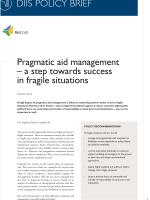Successful aid in fragile situations
The Danish government has recently launched a paper underlining its commitment to engage in fragile situations. The paper reinforces the policy to allocate aid increasingly to unstable societies and away from the traditional, relatively stable low-income countries. At the same time, the government does not want to set aside additional resources for the Foreign Service. Are these different policies compatible?
ThisDIIS Report sheds light on this question by examining the relationship between aid management and results in the context of fragile situations. The success of aid-supported activities in fragile situations is highly uncertain. Yet, aid programmes sometimes succeed despite the adverse conditions. The report discusses the extent to which pragmatic aid management can explain relatively positive results based on an analysis of evaluations of reasonably successful aid-supported activities.It concludes that, while a high degree of pragmatic aid management appears to be linked to relatively positive results of aid-supported activities, such aid management is rarely enough to count as success. Other factors are important as well. These include high-level political commitment, quality of aid management staff on the ground, and a process of transferring ownership and responsibility to actors and institutions in fragile societies.
The report will be presented at the ReCom Results Meeting: Challenges in Fragility and Governance, Copenhagen, 23 October, 2013.
The study is part of the programme “ReCom – Research and Communication on Foreign Aid” lead by United Nations University, World Institute for Development Economics Research (UNU-WIDER), Helsinki, and financed by DANIDA and SIDA.
DIIS Eksperter

